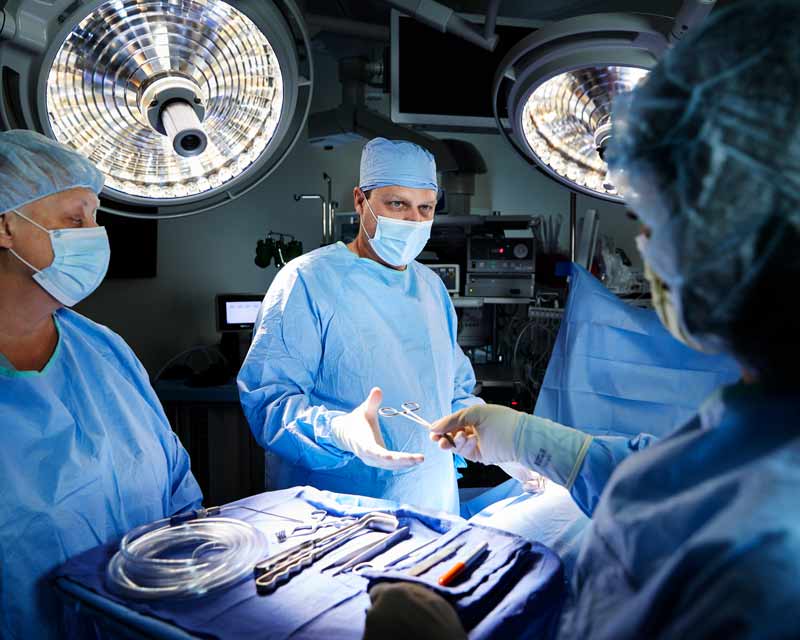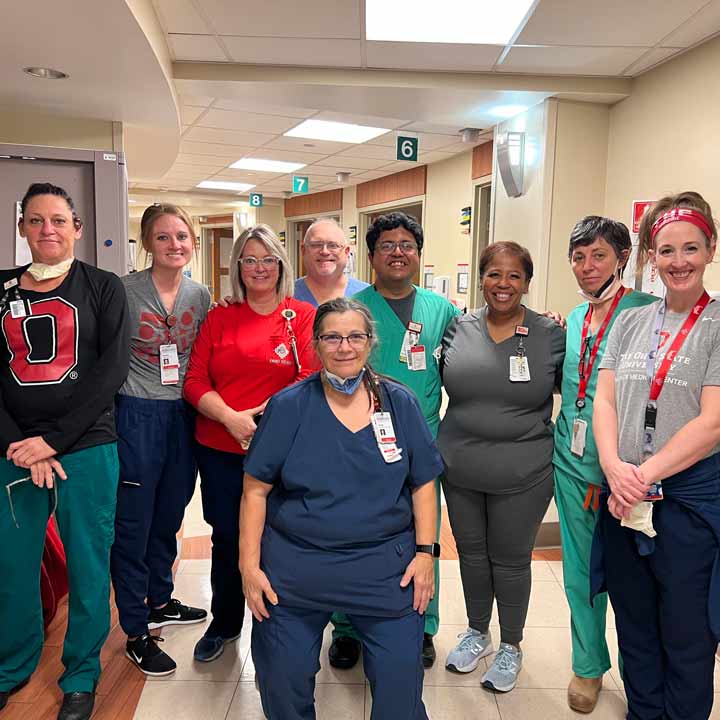
Comprehensive Esophageal Health Center opens with more convenient, streamlined care
 Knowing that overall cancer mortality is higher in disadvantaged communities, a medical team from The Ohio State University Wexner Medical Center has established a free colonoscopy program.
Knowing that overall cancer mortality is higher in disadvantaged communities, a medical team from The Ohio State University Wexner Medical Center has established a free colonoscopy program.
The initiative was founded in 2022 by Ohio State gastroenterologist Samuel Akinyeye, MD, a clinical assistant professor of Internal Medicine in the Division of Gastroenterology, Hepatology and Nutrition in the Ohio State College of Medicine. He co-leads the program with gastroenterologist Subhankar Chakraborty, MD, PhD, clinical assistant professor of Internal Medicine, and Jackiethia Butsch, C-CHW, senior outreach coordinator for the Ohio State Wexner Medical Center’s Office of Health Equity.
“Research confirms that overall cancer mortality is significantly higher in communities with persistent poverty, and right in central Ohio, we can see this pattern,” Dr. Akinyeye says.
He points to a 27.6-year life-expectancy gap between one Columbus suburb that’s about 77% white and 0.6% Black and one of the urban neighborhoods where the population is 51.3% white and 44.1% Black. In another comparison of neighborhoods that are just 1 mile apart — one predominantly white and the other predominantly Black — there’s an 18.3-year gap.
“In just over a year, we’ve completed well over 100 colonoscopies and removed more than 150 polyps, so that translates to a lot of lives potentially saved,” Dr. Akinyeye says. “We’re determined to close those gaps, at least as they relate to cancer.”
The program continues to expand and now offers Saturday screenings on a quarterly basis provided by a team of nearly 20 Ohio State physicians, staff and volunteers.
Many of the screening program patients are referred by the Columbus Free Clinic, which is run by Ohio State medical students and volunteers.
“They’re able to directly identify at-risk individuals based on family history, symptoms or health, and they encourage average-risk patients to get that first screening colonoscopy starting at age 45,” Dr. Akinyeye says.
He notes multiple benefits of the clinic partnership. “There’s an education component for our med students,” he says. “They’re seeing the value in early screening. They’re hearing firsthand from patients why people haven’t had or don’t want a colonoscopy — and they’re learning the best ways to talk with, encourage and follow-up with those patients.
“Most importantly, this partnership gives us direct access to a population that’s not always easy to reach. It gives us a platform for education and allows us to build on an existing health care relationship.”
Dr. Akinyeye emphasizes that it takes more than available space and screening equipment to make a program like this work.
“It all starts with education, with each person on our team serving as a touchpoint,” he says. “The community needs to understand why colonoscopies are so important, but once we’ve set an appointment, we need to do everything we can to help every person feel comfortable with the process and complete their bowel prep as prescribed.”
The program uses a virtual model to demonstrate how colonoscopies work, and a team member checks in with patients the night before an appointment to answer questions and confirm proper bowel preparation.
“After getting someone scheduled, we don’t want to have to cancel because of that last crucial step,” Dr. Akinyeye says. “We’re at close to 100% for correct bowel prep prior to procedures, so what we’re doing puts us well above the national average.”
The colonoscopy screening program also focuses on solving barriers to access, such as lack of transportation, and the team has even provided temporary housing at a local hotel to help people who don’t have a private space for prep or recovery.
“Our plan is to explore the possibility of adding more services, like diagnostic procedures, and offering colonoscopy with anesthesia for sicker patients,” Dr. Akinyeye says. “Right now, we use just conscious sedation because it’s easier operationally.”
Dr. Akinyeye admits that, just like any free medical program, funding remains an ongoing task — but staffing has never been an issue.
“From the top down in our division, there has been palpable support for this program,” he says. “The GI physicians and endoscopy staff who work these Saturday sessions have a real love and desire to continue.”
The need is real, and the appreciation from patients is incredible.
“We honestly look forward to the next session as soon as we’ve finished the last.”